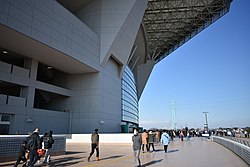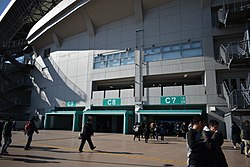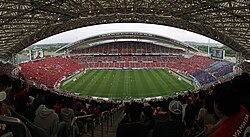| 埼玉スタジアム2002 | |
| Saisuta | |
 | |
| Full name | Saitama Stadium 2002 |
|---|---|
| Location | Midori-ku, Saitama, Saitama Prefecture, Japan |
| Public transit | |
| Owner | Saitama Prefecture |
| Operator | Saitama Prefectural Park Association |
| Capacity | 63,700 |
| Record attendance | 63,551 (Japan vs Oman, 3 June 2012) |
| Field size | 105 x 68 m |
| Surface | Grass |
| Opened | 1 October 2001 |
| Tenants | |
| Urawa Red Diamonds (2001–present) Japan national football team (select matches)
| |
Saitama Stadium 2002 (埼玉スタジアム2002, Saitama Sutajiamu Nimarumaruni), a.k.a. the Saitama Stadium (埼玉スタジアム, Saitama Sutajiamu) or simply Saisuta (埼スタ), is a football stadium located in Midori-ku, Saitama, Japan.
Currently, J1 League club Urawa Red Diamonds use this stadium for home games. It is the largest football-specific stadium in Japan and is one of the largest stadiums in Asia. It has hosted the semi-finals of both the 2002 FIFA World Cup and the football tournament at the 2020 Summer Olympics. It is also the home stadium of Japan national football team in almost every FIFA World Cup qualifying matches.
History
Built by Azusa Sekkei to host matches of the 2002 FIFA World Cup, construction was completed in September 2001. The stadium holds 63,700 people, although for segregation reasons league games hosted at the ground have a reduced capacity of 62,300. The Saitama Stadium hosted four matches during the 2002 FIFA World Cup, including co-host Japan's first match against Belgium.
Between 2005 and 2007, the Urawa Red Diamonds' local derby rival Omiya Ardija hosted matches here along with Urawa Komaba due to expansion of its home Ōmiya Park Soccer Stadium.The stadium was also featured in the remastered version of the anime Captain Tsubasa where in the middle school tournament the stadium was mostly shown as the main stadium.
Transport issues
The ease of access of the stadium has been a problem known to the prefectural government, academics and the home team for years, mostly concerning the congested road traffic and the fact that it is 20-minute walk from the nearest station, Urawa-Misono. From Tokyo station, the stadium is 45 minutes by train plus 1.2 km walking on foot, or 40 minutes drive.
A survey in 2017 found that on an international matchday, with typically 60,000 attendance, 60.5% (36,000) arrived by railway, 25.2% (15,000) drove cars, 8.7% (5,200) took intra-prefecture shuttle bus, and 3,300 (5.6%) arrived by bicycle, motorbikes or on foot. On a J. League club match typically with 40,000 attendance, railway usage dropped sharply to 40.6% while usage of all other modes of transport increased.
The road congestion caught international attention in the 2026 FIFA World Cup qualifiers, scheduled to kick-off at 19:35, October 15, 2024. Australia, staying in the five-star Hotel Chinzanso Tokyo in downtown Bunkyō, Tokyo, took 2 hours 9 minutes (16:37-18:46) in their chartered coach to arrive the stadium. Ordinary driving time from Tokyo Station is estimated to be 40 minutes, according to the stadium.
FIFA World Cup
The stadium was one of the venues of the 2002 FIFA World Cup, and held the following matches:
| Date | Team 1 | Result | Team 2 | Round |
|---|---|---|---|---|
| 2 June 2002 | 1–1 | Group F | ||
| 4 June 2002 | 2–2 | Group H | ||
| 6 June 2002 | 1–0 | Group E | ||
| 26 June 2002 | 1–0 | Semi-finals |
Olympic Games
| Date | Time (JST) | Team 1 | Result | Team 2 | Round | Attendance |
|---|---|---|---|---|---|---|
| 25 July 2021 | 17.00 | 4–3 | Group A | 0 | ||
| 25 July 2021 | 20.00 | 0–1 | Group A | 0 | ||
| 28 July 2021 | 20.00 | 1–1 | Group C | 0 | ||
| 28 July 2021 | 17.00 | 1–3 | Group D | 0 | ||
| 31 July 2021 | 19.00 | 1–0 | Quarter-finals | 0 | ||
| 3 August 2021 | 20.00 | 0–1 | Semi-finals | 0 | ||
| 6 August 2021 | 18.00 | 3–1 | Bronze-medal match | 0 |
| Date | Time (JST) | Team 1 | Result | Team 2 | Round | Attendance |
|---|---|---|---|---|---|---|
| 24 July 2021 | 17.30 | 4–2 | Group G | 0 | ||
| 24 July 2021 | 12.30 | 1–6 | Group G | 0 | ||
| 30 July 2021 | 12.30 | 3–1 | Quarter-finals | 0 |
Structural design
- Building area: 54,420 m
- Total floor area: 62,674 m
- Covered area: 29,000 m
- Stand inclination: Max. 30 degree angle
Gallery



 Stadium exterior
Stadium exterior

 Japan vs Australia in 2014 FIFA World Cup qualification – AFC fourth round.
Japan vs Australia in 2014 FIFA World Cup qualification – AFC fourth round. 2020 Summer Olympics
2020 Summer Olympics Panorama
Panorama




See also
References
- "Saitama Stadium 2002 Information". Saitama Stadium 2002. Retrieved 24 February 2016.
- "Saitama Stadium". FIFA. Retrieved 2021-08-30.
- "Saitama Stadium 2002". Information from Saitama Prefecture for the Tokyo 2020 Olympic and Paralympic Games!. Retrieved 2021-08-30.
- "Venue Plan". Tokyo 2020 Bid Committee. Archived from the original on 27 July 2013. Retrieved 11 September 2013.
- ^ 平成23年度地下鉄7号線延伸検討委員会 (2011). "[資料一]路線整備の意義・必要性等の整理" (PDF). 埼玉県企画財政部交通政策課. p. 2, 5. Archived from the original (PDF) on 2024-06-13.
{{cite news}}: CS1 maint: numeric names: authors list (link) - ^ 一般社団法人美園タウンマネジメント; さいたま市浦和東部まちづくり事務所 (2018). "埼玉スタジアム2002アクセス改善を通じた"スタジアムタウン"ブランドの醸成─観戦者交通と生活交通の共存・協調に向けた主体間連携による戦略策定と実践─" (PDF). 道路行政セミナー (12). Archived from the original (PDF) on 2020-07-23.
- ^ "立花代表、内舘、室井、堀之内が埼玉県庁とさいたま市役所を訪問、「地下鉄7号線延伸」および「埼玉スタジアム駅等の設置」の要望書と請願署名を提出". Urawa Red Diamonds official website. 2020-02-03.
- ^ "Directions". Saitama Stadium official website. Archived from the original on 2023-02-04. Retrieved 2023-02-04.
By Car: Urawa interchange - 10 minutes, Iwatsuki interchange - 15 minutes, Tokyo Station - 40 minutes, Haneda Airport - 50 minutes
- "五輪にらみ埼玉スタジアムの交通改善 シャトルバス優先など". 日本経済新聞. 2018-04-09. Archived from the original on 2018-04-10.
- McKern, James (2024-10-15). "Socceroos dudded by 'scandalous' decision after chaotic scenes unfold". news.com.au.
- ^ Smyth, Rob (2024-10-15). "Admirable defensive performance earns the Socceroos a vital point in a match of two own goals against the Samurai Blue". The Guardian. Archived from the original on 2024-10-16.
Socceroos team bus set out at 4:37pm from Bunkyo and arrived in Saitama 6:46pm - Two hours and nine minutes. JFA and FA requested a delay to kickoff but AFC declined— Joey Lynch
- @Socceroos (2024-10-15). "One final stretch of the legs on matchday 👟 Tonight's kick off in Japan awaits". Twitter. Archived from the original on 2024-10-16.
External links
- Official website (in English)
- Stadium Guide Article
| Events and tenants | ||
|---|---|---|
| Preceded byNational Stadium | All Japan High School Soccer Tournament finals venue 2014–present |
Succeeded byTBD |
| Preceded byNational Stadium | Host of the J.League Cup finals 2014–present |
Succeeded bycurrent |
35°54′11.2″N 139°43′3.0″E / 35.903111°N 139.717500°E / 35.903111; 139.717500
| Urawa Red Diamonds | |
|---|---|
| General | |
| Home stadium | |
| Rivalries | |
| Seasons | |
| 2002 FIFA World Cup stadiums | |
|---|---|
| South Korea |
|
| Japan |
|

